
Forensic Toxicology
Scope & Guideline
Bridging Disciplines for Enhanced Forensic Insights
Introduction
Aims and Scopes
- Forensic Analysis of Toxic Substances:
The journal primarily focuses on the analysis of various toxic substances, including drugs, alcohol, and poisons, in biological samples such as blood, urine, hair, and tissues. This includes developing and validating analytical methods for accurate detection and quantification. - Methodological Innovations in Toxicology:
A significant aim is to present innovative methodologies in forensic toxicology, including advanced techniques such as liquid chromatography-tandem mass spectrometry (LC-MS/MS), gas chromatography-mass spectrometry (GC-MS), and novel extraction methods. - Understanding Drug Metabolism and Toxicity:
Research published in the journal often explores the metabolism of drugs and their toxic effects on biological systems. This includes in vivo and in vitro studies that contribute to the understanding of drug interactions and toxicity profiles. - Postmortem Toxicology Studies:
A core area of focus is postmortem toxicology, which deals with the analysis of toxic substances in deceased individuals. The journal publishes studies on the interpretation of toxicological data in the context of autopsy findings. - Emerging Drugs of Abuse:
The journal addresses emerging trends in drug abuse, particularly new psychoactive substances (NPS) and synthetic cannabinoids. It provides insights into their detection, effects, and implications for public health and safety.
Trending and Emerging
- Synthetic Cannabinoids and Novel Psychoactive Substances (NPS):
There is a marked increase in research focusing on synthetic cannabinoids and NPS, highlighting their rising prevalence in drug abuse cases. This includes studies on their detection, metabolism, and toxicological effects. - Micro-segmental Hair Analysis:
Micro-segmental analysis is becoming a prominent theme, with an emphasis on its application in determining drug exposure history and personal profiling. This technique allows for a more granular understanding of drug accumulation in hair over time. - Bioinformatics and Metabolomics:
The integration of bioinformatics and metabolomic profiling in forensic toxicology is emerging as a key theme. This approach enhances the ability to screen for drug abuse and understand complex biochemical interactions. - Environmental and Contextual Effects on Drug Stability:
Research is increasingly focusing on how environmental factors affect drug stability in biological matrices, which is crucial for accurate toxicological assessments, especially in postmortem cases. - Case Studies Involving COVID-19 Impact:
The pandemic has prompted an increase in studies examining the effects of COVID-19 on drug abuse patterns and toxicological profiles, reflecting the need for timely research in response to global health crises.
Declining or Waning
- Traditional Drug Analysis:
There has been a noticeable decrease in papers focused on traditional drug analysis methods, such as basic GC and HPLC techniques, as the field rapidly evolves towards more sophisticated and sensitive methods like LC-MS/MS. - General Toxicology Reviews:
Research articles that provide broad overviews of toxicology without specific forensic applications have diminished. There is a growing preference for studies that present novel findings or methodologies directly applicable to forensic cases. - Historical Toxicology Studies:
The journal appears to be moving away from historical analyses of older substances, such as classic recreational drugs, in favor of contemporary issues related to emerging synthetic drugs and their implications. - Case Reports on Non-psychoactive Substances:
There is a decline in case reports focusing on non-psychoactive substances or less commonly abused compounds, as the journal prioritizes studies that address prevalent and emerging drugs of abuse.
Similar Journals

CHEMICAL RESEARCH IN TOXICOLOGY
Advancing toxicological science through chemical insights.Chemical Research in Toxicology is a premier journal published by the American Chemical Society, dedicated to advancing the understanding of toxicological effects associated with chemical substances. Since its inception in 1988, this esteemed journal has maintained a robust impact factor, ranking in the Q1 quartile for both Medicine (miscellaneous) and Toxicology as of 2023, reflecting its significance and influence in the fields of pharmacology and toxicology. With an impressive Scopus ranking at #16 out of 133 in the Toxicology category, it serves as a vital resource for researchers, professionals, and students seeking cutting-edge insights and scholarly articles that bridge the gap between chemistry and toxicological science. Although not an open-access publication, it continues to provide comprehensive analyses and original research that inform safe chemical practices and regulatory policies, further enhancing its role in public health and safety.
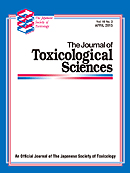
JOURNAL OF TOXICOLOGICAL SCIENCES
Shaping the Future of Toxicological ResearchThe Journal of Toxicological Sciences, published by the Japanese Society of Toxicological Sciences, is a prominent academic journal dedicated to the comprehensive study of toxicology and its related fields. Since its inception in 1976, the journal has provided a vital platform for researchers and professionals to disseminate innovative findings and insights in toxicology, with a focus on both experimental and clinical studies. Positioned in the Q3 quartile across various relevant categories, including Medicine (miscellaneous) and Toxicology as of 2023, the journal plays an essential role in advancing our understanding of toxic substances and their effects on biological systems. Although currently not open access, the journal maintains high academic standards and is indexed in Scopus, ranking #96 in Toxicology. Offering unique perspectives from Japan, it encourages global collaboration and discourse among toxicologists, making it an invaluable resource for students, researchers, and industry professionals alike.
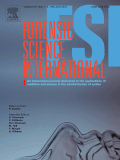
Forensic Science International
Exploring the Frontiers of Forensic ScienceForensic Science International is a premier journal published by Elsevier Ireland Ltd, dedicated to advancing the field of forensic science through interdisciplinary research and scholarship. Since its inception in 1978, this esteemed journal has provided a platform for vital research, receiving recognition in the Q1 category for both Law and Pathology and Forensic Medicine as of 2023, underscoring its significant impact in these domains. It currently ranks 54th out of 1025 journals in Social Sciences - Law and 51st out of 208 in Medicine - Pathology and Forensic Medicine, placing it in the top echelons of academic journals according to Scopus metrics. Forensic Science International transitioned to Open Access in 2019, ensuring that critical findings are widely available to the global research community and enhancing collaboration among forensic professionals. With a forward-looking scope that evolves to meet the challenges and innovations of forensic science, this journal remains a pivotal resource for researchers, practitioners, and students who are committed to the continued advancement of forensic science and its applications in legal contexts.
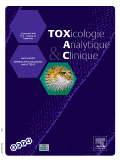
Toxicologie Analytique et Clinique
Innovating Research for Safer Clinical PracticesToxicologie Analytique et Clinique is a distinguished journal published by ELSEVIER MASSON SAS EDITEUR, specializing in the ever-evolving fields of toxicology and clinical analysis. With its ISSN number 2352-0078 and E-ISSN 2352-0086, this journal has been contributing to the scientific dialogue since its inception in 2014, with a converged publication timeline extending to 2024. Despite its current standing in the Q4 category for both Health, Toxicology and Mutagenesis, and Toxicology in the 2023 metrics, as indicated by its rankings on Scopus, Toxicologie Analytique et Clinique remains a crucial platform for disseminating vital research within these domains. The journal's focus on analytical and clinical toxicology makes it an invaluable resource for researchers, practitioners, and students, seeking to enhance their understanding and methodologies in toxicological studies. As a vital contributor to the academic landscape, Toxicologie Analytique et Clinique aims to provide a rich repository of knowledge that promotes innovation and safety in clinical practices and environmental science.

Current Research in Toxicology
Bridging Academia and Industry in ToxicologyCurrent Research in Toxicology is a pioneering journal published by ELSEVIER that serves as a vital platform for disseminating cutting-edge research in the field of toxicology, spanning from biological impacts to pharmacological applications. With an ISSN of 2666-027X and an impressive Q2 ranking in key categories such as Applied Microbiology and Biotechnology, Health, Toxicology and Mutagenesis, and Toxicology, this journal underscores its commitment to high-quality research and significant contributions to the scientific community. Based in the Netherlands, Current Research in Toxicology aims to bridge the gap between academia and industry by providing rigorously peer-reviewed articles that cover a wide array of topics including novel methodologies, regulatory challenges, and emerging trends within the domain. The journal is accessible through various platforms, making it essential for researchers, professionals, and students eager to stay updated on the latest findings and advancements in toxicology. With a comprehensive focus on integrating theory with practical application, this journal is poised to influence future studies and policies in health and environmental science.
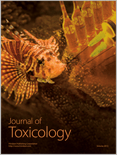
Journal of Toxicology
Innovating safety through cutting-edge toxicological research.Journal of Toxicology, published by HINDAWI LTD, stands as a pivotal open-access journal in the fields of toxicology and pharmacology since its inception in 2009. With an ISSN of 1687-8191 and an E-ISSN of 1687-8205, this journal is dedicated to disseminating high-quality research that critically examines the effects of toxic substances on living organisms. Located in Egypt and operating from their London office, it aims to provide an extensive platform for researchers worldwide to share findings that can inform better practices in safety and regulation. As of 2023, it has achieved significant recognition, holding a Q3 ranking in both the pharmacology and toxicology categories, and is indexed in Scopus with noteworthy percentile rankings (Toxicology: 57th and Pharmacology: 55th). With a focus on innovative studies and emerging areas such as environmental toxicology, biomarker research, and therapeutic interventions, the Journal of Toxicology invites both experienced researchers and students to contribute, thereby enhancing the breadth and depth of toxicological knowledge for the global scientific community.
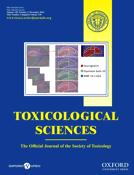
TOXICOLOGICAL SCIENCES
Advancing Toxicology for a Safer TomorrowTOXICOLOGICAL SCIENCES, published by Oxford University Press, is a premier journal in the field of toxicology that has been a cornerstone of scientific discourse since its inception in 1981. With an impressive 2023 impact factor and ranked in the Q1 category for Toxicology, this journal is highly regarded among researchers, professionals, and students dedicated to pharmacology and toxicology. The journal is committed to advancing the understanding of toxicological science, covering a breadth of topics that include the mechanisms of toxicity, risk assessment, and the regulatory aspects affecting public health. With an ISSN of 1096-6080 and an E-ISSN of 1096-0929, TOXICOLOGICAL SCIENCES facilitates open access scholarly work, ensuring that critical research reaches a global audience and promotes collaborative learning. As it converges towards 2024, the journal remains pivotal in shaping the future of toxicology research, providing insights that are essential for developing safer chemicals and protecting environmental health.

Forensic Science Medicine and Pathology
Advancing the Frontiers of Forensic Science and MedicineForensic Science Medicine and Pathology is an esteemed journal published by HUMANA PRESS INC, focusing on the critical intersections of forensic science, medicine, and pathology. Since its inception in 2005, this journal has provided a vital platform for researchers and practitioners to share innovative studies and findings that enhance our understanding of forensic methodologies and their applications in medical contexts. With an impact factor reflecting its significant contribution to the field, it holds a Q3 ranking in Medicine (miscellaneous) and a commendable Q2 ranking in Pathology and Forensic Medicine as of 2023, indicating its growing influence among scholarly circles. The journal is indexed in Scopus, ranking #76 out of 208 in the Medicine – Pathology and Forensic Medicine category, placing it in the 63rd percentile. Despite it not being an Open Access journal, it remains a crucial resource for professionals, students, and researchers dedicated to forensic sciences and related disciplines. For those seeking cutting-edge research and advancements in forensic methodologies, this journal is an essential addition to any academic repertoire.
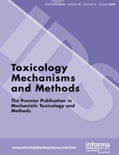
TOXICOLOGY MECHANISMS AND METHODS
Leading the charge in toxicology advancements globally.TOXICOLOGY MECHANISMS AND METHODS is a distinguished peer-reviewed journal dedicated to the advancement of toxicological research, published by Taylor & Francis Ltd. With its ISSN 1537-6516 and E-ISSN 1537-6524, this esteemed journal features critical studies and innovative methodologies in the field of toxicology, aligning with its mission to enhance understanding of biological mechanisms and risk assessment. The journal holds a commendable Q2 ranking in both the Health, Toxicology and Mutagenesis, and Toxicology categories, as well as strong positions in Scopus rankings, reflecting its influence with a 71st percentile rank in Toxicology and a 69th percentile rank in Environmental Health. Researchers, professionals, and students in the toxicology domain will find this journal to be an invaluable resource, offering open access options that foster widespread dissemination of its findings. Since its inception, encompassing converged years from 1991 to 1995 and from 2002 to 2024, the journal remains at the forefront of critical discourse and innovative research methods, making it a vital platform for advancing toxicological science globally.

Frontiers in Toxicology
Shaping the Future of Toxicological UnderstandingFrontiers in Toxicology, published by Frontiers Media SA, is a prominent open-access journal dedicated to advancing the understanding of toxicological science. Established in 2019, it serves as a vital forum for innovative research, offering insights into the pharmacological impacts and toxicological profiles of various substances. With its international reach based in Switzerland, this journal has quickly ascended in the academic community, achieving a notable Q1 ranking in Pharmacology, Toxicology and Pharmaceutics (Miscellaneous) and a Q2 ranking in Toxicology as of 2023. The journal is indexed in Scopus, where it ranks #8 out of 43 in its primary category, underscoring its influence and relevance in the field. The scope encompasses cutting-edge studies on the mechanisms of toxicity, including both human and environmental impacts, making it an essential resource for researchers, professionals, and students alike. By promoting open access to high-quality research, Frontiers in Toxicology plays a crucial role in enhancing knowledge sharing and fostering collaboration across disciplines.